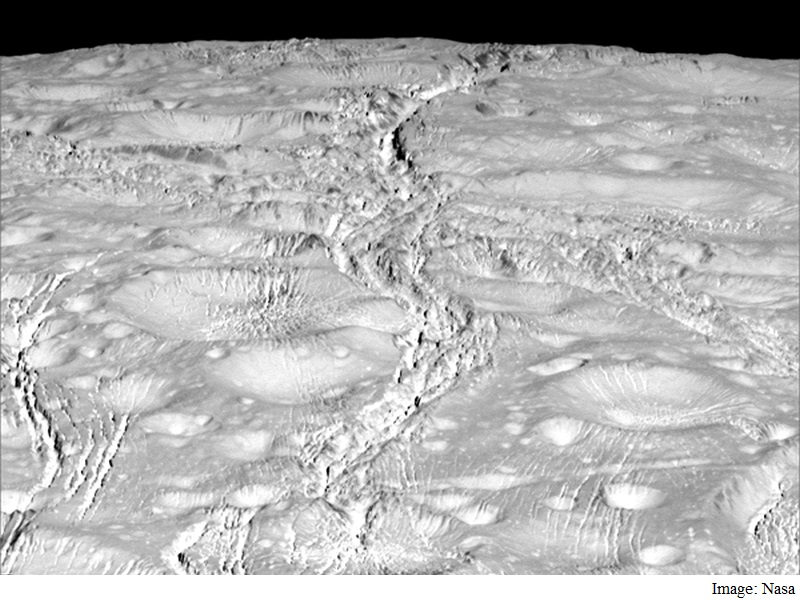- Home
- Science
- Science News
- Nasa's Cassini Returns High Quality Images of Saturn's Moon Enceladus
Nasa's Cassini Returns High-Quality Images of Saturn's Moon Enceladus

Nasa's Cassini spacecraft has begun returning its best-ever views of the northern extremes of Saturn's icy, ocean-bearing moon Enceladus.
The spacecraft obtained the images during its 14 October flyby, passing 1,839 kilometres above the moon's surface.
Mission controllers said the spacecraft would continue transmitting images and other data from the encounter for the next several days.
Scientists expected the north polar region of Enceladus to be heavily cratered, based on low-resolution images from the Voyager mission, but the new high-resolution Cassini images show a landscape of stark contrasts.
"The northern regions are crisscrossed by a spidery network of gossamer-thin cracks that slice through the craters," said Paul Helfenstein, a member of the Cassini imaging team at Cornell University, Ithaca, New York.
"These thin cracks are ubiquitous on Enceladus, and now we see that they extend across the northern terrains as well," he added.
Cassini's next encounter with Enceladus is planned for 28 October, when the spacecraft will come within 49 kilometres of the moon's south polar region.
During the encounter, Cassini will make its deepest-ever dive through the moon's plume of icy spray, sampling the chemistry of the extraterrestrial ocean beneath the ice.
Mission scientists are hopeful data from that flyby will provide evidence of how much hydrothermal activity is occurring in the moon's ocean, along with more detailed insights about the ocean's chemistry - both of which relate to the potential habitability of Enceladus.
Cassini's final close Enceladus flyby will take place on 19 December, when the spacecraft will measure the amount of heat coming from the moon's interior. The flyby will be at an altitude of 4,999 kilometres.
Get your daily dose of tech news, reviews, and insights, in under 80 characters on Gadgets 360 Turbo. Connect with fellow tech lovers on our Forum. Follow us on X, Facebook, WhatsApp, Threads and Google News for instant updates. Catch all the action on our YouTube channel.
Related Stories
- Samsung Galaxy Unpacked 2026
- iPhone 17 Pro Max
- ChatGPT
- iOS 26
- Laptop Under 50000
- Smartwatch Under 10000
- Apple Vision Pro
- Oneplus 12
- OnePlus Nord CE 3 Lite 5G
- iPhone 13
- Xiaomi 14 Pro
- Oppo Find N3
- Tecno Spark Go (2023)
- Realme V30
- Best Phones Under 25000
- Samsung Galaxy S24 Series
- Cryptocurrency
- iQoo 12
- Samsung Galaxy S24 Ultra
- Giottus
- Samsung Galaxy Z Flip 5
- Apple 'Scary Fast'
- Housefull 5
- GoPro Hero 12 Black Review
- Invincible Season 2
- JioGlass
- HD Ready TV
- Latest Mobile Phones
- Compare Phones
- Leica Leitzphone
- Samsung Galaxy S26+
- Samsung Galaxy S26 Ultra
- Samsung Galaxy S26
- iQOO 15R
- Realme P4 Lite
- Vivo V70
- Vivo V70 Elite
- Asus TUF Gaming A14 (2026)
- Asus ProArt GoPro Edition
- Huawei MatePad Mini
- Infinix Xpad 30E
- Huawei Watch GT Runner 2
- Amazfit Active 3 Premium
- Xiaomi QLED TV X Pro 75
- Haier H5E Series
- Asus ROG Ally
- Nintendo Switch Lite
- Haier 1.6 Ton 5 Star Inverter Split AC (HSU19G-MZAID5BN-INV)
- Haier 1.6 Ton 5 Star Inverter Split AC (HSU19G-MZAIM5BN-INV)

















